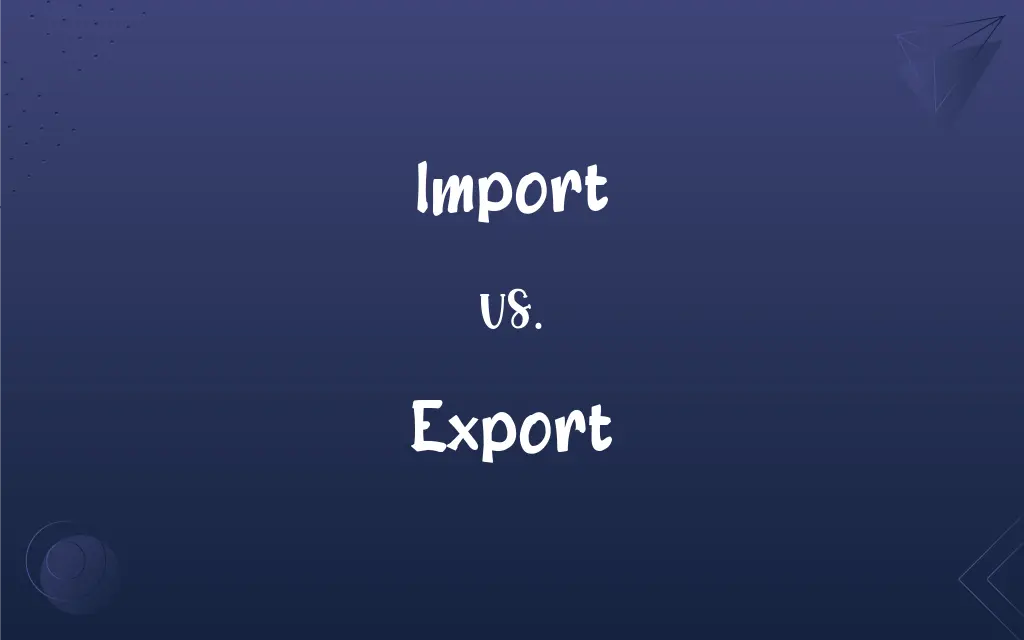Import vs. Export: What's the Difference?
Edited by Aimie Carlson || By Harlon Moss || Updated on October 9, 2023
Import refers to bringing goods/services into a country from abroad. Export means sending goods/services from one country to another.

Key Differences
Import and export essentially differentiate the directional flow of goods or services between countries or territories. While import denotes bringing in goods/services from a foreign country, export implies sending domestic goods/services to a foreign country for sale or use.
Economically speaking, when a country imports goods, it buys products from foreign markets to meet domestic demands that cannot be met by local production. Conversely, exports play a crucial role in a nation's trade balance, typically bringing in revenue by selling domestically produced goods to external markets.
Often, countries import products that are scarce or unavailable domestically but are available in other countries. Exporting can refer to not only tangible goods but also services and intellectual property, amplifying a country’s economic reach.
A tangible example of import might involve a country buying specialized technology or commodities like oil from other countries. On the flip side, export activities might include a country with a booming tech industry selling its innovations overseas.
A country may import products to achieve a favorable trade balance, especially if it can export high-demand goods. Various factors, like production costs and natural resource availability, often determine what countries import or export.
ADVERTISEMENT
Comparison Chart
Definition
Bringing goods/services from abroad
Sending goods/services to other nations
Purpose
To acquire goods unavailable or scarce domestically
To sell goods/services internationally, often generating revenue
Economic Impact
Can cause a trade deficit if excessive
Generally beneficial for trade balance
Example Goods
Oil, exotic fruits, technology
Automobiles, machinery, intellectual property
Related Term
Importer (entity bringing goods in)
Exporter (entity sending goods out)
ADVERTISEMENT
Import and Export Definitions
Import
To bring goods or services into a country from abroad for the purpose of selling them.
The United States decided to import more coffee beans from Brazil to meet the increasing demand.
Export
The act of conveying or transmitting items from one country to another.
The export of technology has been crucial in spreading innovation globally.
Import
The act or instance of importing goods or services.
The import of exotic fruits has expanded our supermarket selection.
Export
To send goods or services to another country for the purpose of selling them.
The company plans to export its new product line to Asian markets next year.
Import
Something of significance or meaning.
The import of his speech was lost due to his nervous delivery.
Export
To create a file that can be used in another application using a format that the receiving application understands.
You can export your document as a PDF to ensure the formatting remains consistent.
Import
To mean or signify.
His glance seemed to import some hidden meaning that was lost on me.
Export
To spread or introduce (ideas, culture, etc.) to another country.
Hollywood movies export American culture all around the world.
Import
A computer operation in which data is moved from an external source into a software application.
Use the “Import” feature in the software to bring in the external data.
Export
To draw off or remove for use elsewhere.
The plant can export energy to the local power grid during peak production periods.
FAQs
What is meant by export?
Export means sending goods, services, or technologies from one country to another for trade.
What is an import?
An import refers to buying and bringing goods or services from a foreign country into one's own.
Can you give an example of a widely exported product?
Automobiles are widely exported globally, contributing substantially to various national economies.
Can one country restrict the import of specific goods?
Yes, countries may restrict or ban imports of certain goods due to economic, health, or other concerns.
What is a primary export?
A primary export refers to sending raw materials or unprocessed goods, like minerals or agricultural products, to other countries.
How does import impact a country's economy?
Imports can affect the domestic economy by fulfilling consumer demands but might lead to a trade deficit if excessive.
What entities typically handle imports?
Importing is typically managed by businesses, corporations, and sometimes governmental agencies.
Who can export goods and services?
Manufacturers, suppliers, and traders typically engage in exporting goods and services internationally.
What’s the purpose of import regulations?
Import regulations ensure the safe and lawful entry of goods, protecting domestic industry and consumers.
How are exports economically significant?
Exports contribute to a nation's economic growth, enhance trade balances, and create jobs.
What's an example of a common import?
One common import might be petroleum, often imported by countries lacking this natural resource.
What is import duty?
Import duty is a tax imposed by a government on goods being imported to control and regulate foreign trade.
What is the export of services?
Export of services involves providing intangible services like consultancy, software, or tourism to foreign clients.
How does the import of technology impact a nation?
Importing technology can enhance a nation's technological landscape, potentially fostering innovation and development.
How do export tariffs impact trade?
Export tariffs, or taxes on exported goods, can influence trade balances and relationships between countries.
Are imports always tangible goods?
No, imports can also include intangible services and digital products.
What is meant by export quality?
Export quality refers to goods that meet specific standards and criteria, suitable for international trade.
How can a country encourage exports?
Countries can promote exports by implementing policies like subsidies, tax exemptions, and forming trade agreements.
What is an export subsidy?
An export subsidy is a government policy to encourage the exportation of goods, often via financial assistance.
Can individuals engage in importing activities?
Yes, individuals can import goods, often subject to specific rules, regulations, and duties.
About Author
Written by
Harlon MossHarlon is a seasoned quality moderator and accomplished content writer for Difference Wiki. An alumnus of the prestigious University of California, he earned his degree in Computer Science. Leveraging his academic background, Harlon brings a meticulous and informed perspective to his work, ensuring content accuracy and excellence.
Edited by
Aimie CarlsonAimie Carlson, holding a master's degree in English literature, is a fervent English language enthusiast. She lends her writing talents to Difference Wiki, a prominent website that specializes in comparisons, offering readers insightful analyses that both captivate and inform.































































